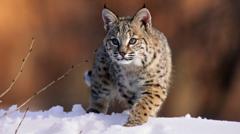In a heartbreaking event for wildlife conservation, a tragic outbreak of bird flu has claimed the lives of 20 big cats at the Wild Felid Advocacy Center in Washington, prompting quarantine measures and mourning among staff.
Bird Flu Devastates Big Cat Population at Washington Sanctuary

Bird Flu Devastates Big Cat Population at Washington Sanctuary
A sanctuary faces tragedy as a bird flu outbreak claims the lives of 20 big cats, including tigers and cougars.
Over the past few weeks, the sanctuary reported that a Bengal tiger, four cougars, five African serval cats, and four bobcats were among those who perished from the viral infection, noted for its transmission primarily through respiratory secretions and contact with infected wild birds. The news comes as bird flu has been spreading through U.S. cattle and poultry populations, raising concerns about its potential risk to humans.
The center's director, Mark Mathews, expressed his sorrow to the New York Times, remarking, "We've never had anything like it; they usually die basically of old age." He described the bird flu as a "wicked virus" that led to the rapid decline in health of the felines, primarily causing pneumonia-like conditions. Tragically, only 17 cats remain at the sanctuary following the outbreak, which began affecting the animals in late November.
In response to the crisis, the sanctuary has closed its doors to the public to mitigate further spread. The organization shared on Facebook that "cats are particularly vulnerable to this virus," emphasizing the quick and devastating nature of its impact.
The larger context of this outbreak shows an unsettling trend as bird flu continues to pose challenges across various animal populations in the United States. The Centers for Disease Control and Prevention (CDC) reported that, as of April 2024, 61 human cases of bird flu have been observed, with severity varying by individual. Most affected have experienced mild symptoms; however, the case of severe illness spotted in Louisiana has raised alarms.
California's Governor Gavin Newsom recently declared a state of emergency concerning a concurrent outbreak affecting dairy cows, indicating a broader response needed to manage this viral threat across animal species and potentially its implications for public health. The continuing evolution of bird flu highlights both its ecological impacts and poses significant questions for wildlife and agricultural management moving forward.
The center's director, Mark Mathews, expressed his sorrow to the New York Times, remarking, "We've never had anything like it; they usually die basically of old age." He described the bird flu as a "wicked virus" that led to the rapid decline in health of the felines, primarily causing pneumonia-like conditions. Tragically, only 17 cats remain at the sanctuary following the outbreak, which began affecting the animals in late November.
In response to the crisis, the sanctuary has closed its doors to the public to mitigate further spread. The organization shared on Facebook that "cats are particularly vulnerable to this virus," emphasizing the quick and devastating nature of its impact.
The larger context of this outbreak shows an unsettling trend as bird flu continues to pose challenges across various animal populations in the United States. The Centers for Disease Control and Prevention (CDC) reported that, as of April 2024, 61 human cases of bird flu have been observed, with severity varying by individual. Most affected have experienced mild symptoms; however, the case of severe illness spotted in Louisiana has raised alarms.
California's Governor Gavin Newsom recently declared a state of emergency concerning a concurrent outbreak affecting dairy cows, indicating a broader response needed to manage this viral threat across animal species and potentially its implications for public health. The continuing evolution of bird flu highlights both its ecological impacts and poses significant questions for wildlife and agricultural management moving forward.





















